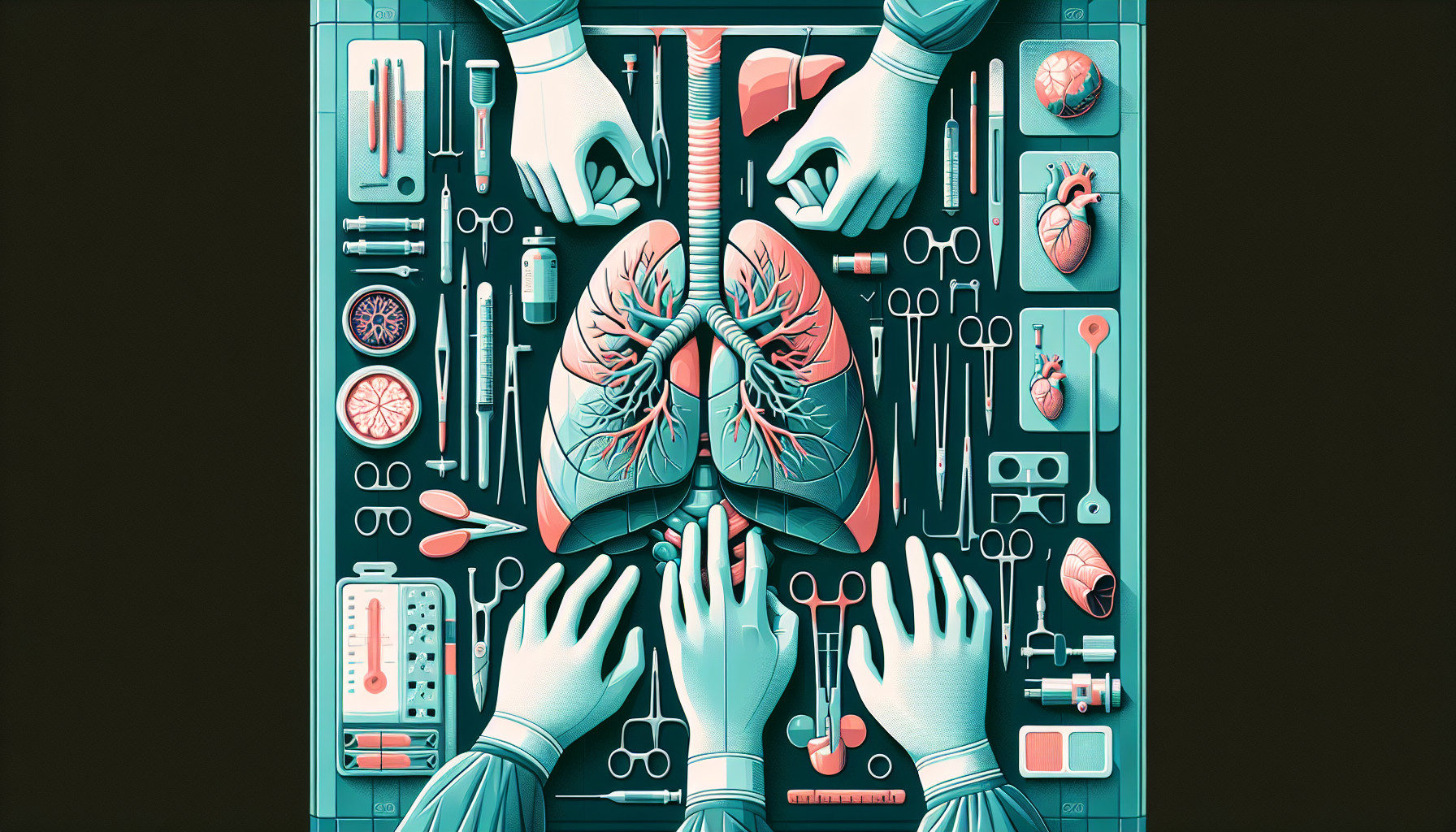Our Summary
This research paper discusses the proper way to manage fluid and nutrition after a lung resection surgery (removal of all or part of the lung). After this surgery, there is a decrease in the lung’s blood vessels which can lead to increased pressure in the lung’s arteries and small blood vessels. This can potentially cause fluid to build up in the lungs, a condition known as pulmonary edema. Because of this risk, it’s important for doctors to give less fluids than usual after lung resection, especially when the whole lung has been removed. This fluid management should be adjusted based on the patient’s vital signs, the amount of fluid being drained from the chest, and chest x-ray results.
The surgery also leaves a bronchial stump, which is where the main airway was cut. This stump does not heal naturally because the lining of the airway on both sides is simply pulled together with stitches or staples. Removing lymph nodes around this area can reduce blood flow, which can further slow down the healing process. This makes it especially important for patients to have proper nutritional support after surgery, particularly if they were already malnourished or are unable to eat enough on their own.
FAQs
- What are the characteristic points in the management of lung resection?
- How does lung resection affect the pulmonary vascular bed and what complications can arise from this?
- Why is appropriate nutritional support necessary after lung resection, especially in patients with poor nutritional status?
Doctor’s Tip
One helpful tip a doctor might tell a patient about lung resection is to closely monitor their fluid intake and to adjust it accordingly. Due to the decrease in pulmonary vascular bed after the surgery, the patient may be more prone to developing pulmonary edema if they receive too much fluid. It is important to communicate with the medical team about any changes in vital signs, chest drainage, and chest x-ray findings to ensure the proper amount of fluid is being administered. Additionally, patients should focus on maintaining good nutrition to support healing, especially if they are in poor nutritional status or are unable to consume enough nutrients orally. This can help promote a successful recovery after lung resection.
Suitable For
Patients who are typically recommended for lung resection include those with lung cancer, non-small cell lung carcinoma, small cell lung carcinoma, metastatic lung tumors, bronchiectasis, tuberculosis, and other lung diseases. Patients who have localized disease that is potentially curable with surgery, good lung function, and are able to tolerate the risks of surgery are usually considered for lung resection. Additionally, patients who have failed to respond to other treatments such as chemotherapy or radiation therapy may also be recommended for lung resection.
Timeline
Before lung resection:
- Patient undergoes preoperative evaluations, including imaging tests and pulmonary function tests
- Patient may undergo bronchoscopy to assess the lungs and airways
- Patient may need to stop smoking and adjust medications before surgery
- Patient may be given instructions for postoperative care and rehabilitation
After lung resection:
- Patient is closely monitored in the recovery room for signs of complications such as bleeding or infection
- Patient may have a chest tube inserted to drain fluid from the surgery site
- Patient is gradually weaned off mechanical ventilation and pain medications
- Patient may receive physical therapy to improve lung function and mobility
- Patient may be discharged from the hospital once stable, with instructions for follow-up appointments and care at home.
What to Ask Your Doctor
- What type of lung resection procedure will be performed and why is it necessary?
- What are the potential risks and complications associated with lung resection surgery?
- How long is the recovery period expected to be and what can I do to help facilitate a smooth recovery?
- Will I need any additional treatments or therapies after the surgery?
- What should I expect in terms of pain management after the surgery?
- How will my lung function be affected after the surgery and what can I do to improve it?
- Are there any dietary restrictions or recommendations I should follow post-surgery?
- What signs or symptoms should I watch for that may indicate a complication or infection after the surgery?
- How often should I follow up with you after the surgery for monitoring and evaluation?
- Are there any lifestyle changes I should consider making to improve my overall lung health after the surgery?
Reference
Authors: Sato Y. Journal: Kyobu Geka. 2017 Jul;70(8):692-695. PMID: 28790291
